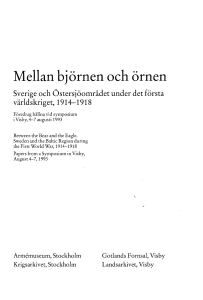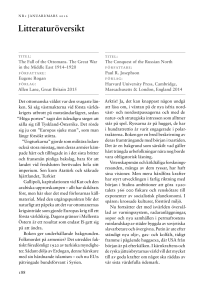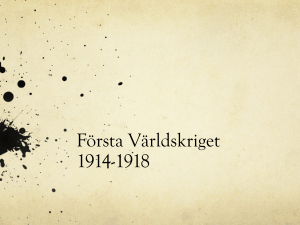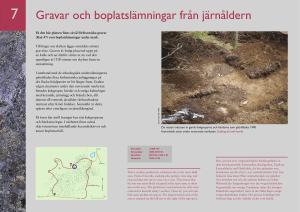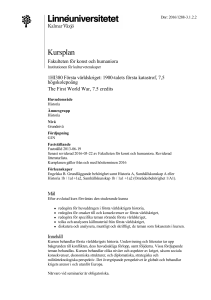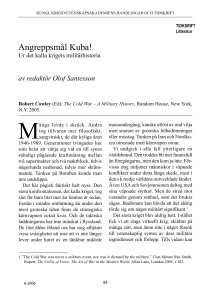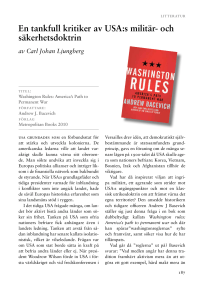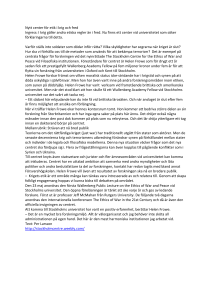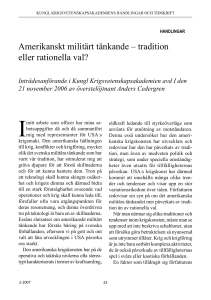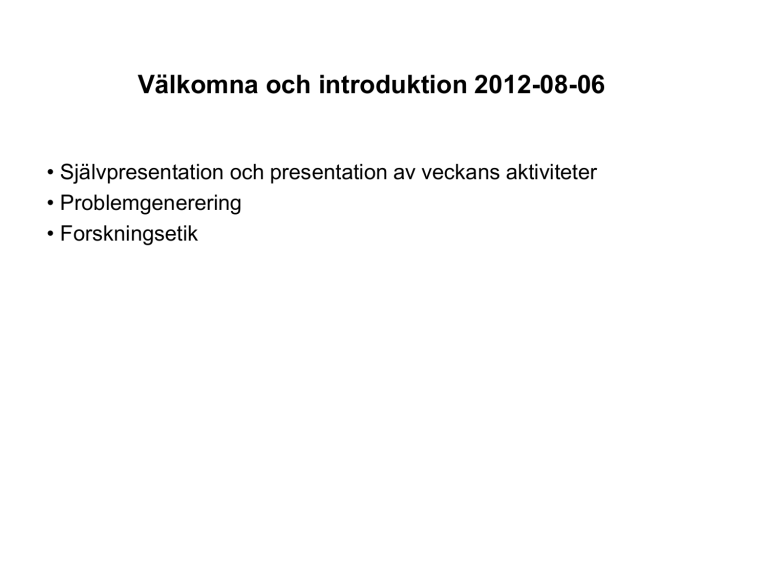
Välkomna och introduktion 2012-08-06
• Självpresentation och presentation av veckans aktiviteter
• Problemgenerering
• Forskningsetik
Självpresentation
•
•
•
•
Professor i modern historia, IFS (en avdelning inom FHS)
Bakgrund svenska FHS 1998-2008
Utbildning av militära och civila studenter på alla nivåer (SU, UiO)
Forskning om militärpolitiska förhållanden i Norden efter 1945,
försvarstransformering samt NATO
• Detta år i princip vid Boston University som gästforskare
• Tag kontakt om det är något Ni lurar på:
[email protected]
23 09 59 19
Veckans aktiviteter
• Målet formulerat i översikten
• ”Examens”-paper (årets tema):
”I den senaste langtidsplanen för Forsvaret sägs att Forsvaret ska
’utgjøre en krigsforebyggende terskel som innebærer høy risiko og
kostnad for den som måtte utfordre norsk sikkerhet og
selvstendighet’. Vad innebär detta, mer konkret, för Forsvaret?
Skissera ett undersökningsupplägg kring den frågan.”
•
•
•
•
Uppfräschning inför Stabsstudiet som har nytt temainslag (NATO)
Tre dagar kvalitativ metod, en dag kvantitativ metod, skrivprocessen
Inga dumma frågor
Tillgänglighet
Problemgenerering
•
1.
2.
3.
Kunskapsproduktion är en iterativ process med tre
huvudkomponenter:
Problemgenerering
Problemlösningsmetod
Problemlösning
•
1.
2.
3.
4.
Hur generera forskningsproblem?
Egen praktik
Nyfikenhet
Litteratur
Perspektiv
Problemgenerering (forts)
•
Forskningsproblem ska vara intressanta, relevanta och
avgränsade
1.
Inte värderande och inte ja eller nej – ointressant (enligt MP)
Exempel 1:
”Har den norska regeringens säkerhetspolitik efter det kalla kriget varit
bra?”
”I vilken utsträckning har den norska regeringens säkerhetspolitik efter
det kalla krigets slut uppfyllt de uppsatta målen och vad kan
förklara målavvikelse?”
Problemgenerering (forts)
Exempel 2 (ointressant, enligt MP):
”Är materielanskaffningsprocesser korrupta?”
”I vilken grad är materielanskaffningsprocesser rationella, i vilken grad
spelar a-rationella överväganden in och vilka ekonomiska
konsekvenser kan avvikelser från rationalitet få?”
Problemgenerering (forts)
2. Inomvetenskaplig och utomvetenskaplig relevans (bördefördelningen
inom NATO)
3. Val och urval (slumpmässigt vs strategiskt) avgränsar
”Hensikten med denna oppgave är att analysera och förklara i vilken
utsträckning Norges beslut att anskaffa JSF var rationellt, i vilken
utsträckning andra överväganden spelade in och vilka ekonomiska
konsekvenser eventuella avvikelser från rationalitet fått.”
Problemgenerering (forts)
• Några exempel på intressanta, relevanta och avgränsade
forskningsproblem (enligt MP):
1) Venneson et al: “Is there a European way of war?”:
“Europe is the region of the world where the network of security
institutions is the densest. Yet, these institutions did not erase
differences about conceptions of force employment among
European countries and between European countries and the
United States. Why have concepts of military power and force
employment remained distinct and varied in Europe, and yet, what
facilitates their convergence at the European Union level into the
ambiguous notion of crisis management? /…/ We explore and
compare empirically the main role conceptions and organizational
frames of the armed forces in France, Germany, Italy, and the UK.”
Problemgenerering (forts)
2) Moriarty: “The vanguards dilemma: Understanding and exploiting insurgent
strategies”
“Carl von Clausewitz once warned statesmen that they must determine ‘the
kind of war upon which they are embarking; neither mistaking it for, nor
trying to turn it into something that is alien to its nature’. While many have
heeded this advice during conventional war, less attention has been paid to
these words during unconventional war; specifically, during guerrilla
warfare. One reason for this apparent lack of appreciation for the character
and nature of guerrilla warfare is that there exists only a relatively small and
sporadic body of literature on the subject. As a result, military and political
leaders often lack the proper theoretical understanding of the type of war
they are entering and often unintentionally play into insurgent strategies by
failing to exploit their weaknesses while attacking their strengths. The
purpose of this paper is to rectify this omission by providing a better
conceptualization of insurgent strategies. Specifically, I shall examine Che
Guevara’s ‘Foco’ theory of insurgency, as it is one of the most theoretically
popular and most pervasive strategies of insurgency currently practiced
throughout the world.”
Problemgenerering (forts)
3) Petersson och Saxi: Shifted Roles?
“/…/ it can therefore be argued that the roles of Denmark and Norway
[within NATO] have traded places during the last 20 years. How did
this happen and why did it happen? The purpose of this article is to
analyze and provide an answer to that question. There are several
fine scholarly contributions regarding the development of the two
countries’ security policies during and after the Cold War, but only a
few that adopt a comparative perspective. The discussion of the
Danish and Norwegian case will thereby contribute to the literature
on Danish and Norwegian – and in a wider sense Nordic – security
policy and strategy during and after the Cold War in a comparative
perspective. The attempt to explain Danish and Norwegian alliance
strategy during and after the Cold War will also contribute
theoretically to the literature on the causes of a (small) state’s
alliance behaviour.”
Forskningsetik
•
•
•
•
•
•
Saklighet, efterprövbarhet och personvärn
Håll Era värderingar utanför
Låt bli att plagiera – det är enkelt
Var försiktig när Ni använder intervjuer
Bli inte avskräckta – hantera problemen istället
Uppdragsforskning

